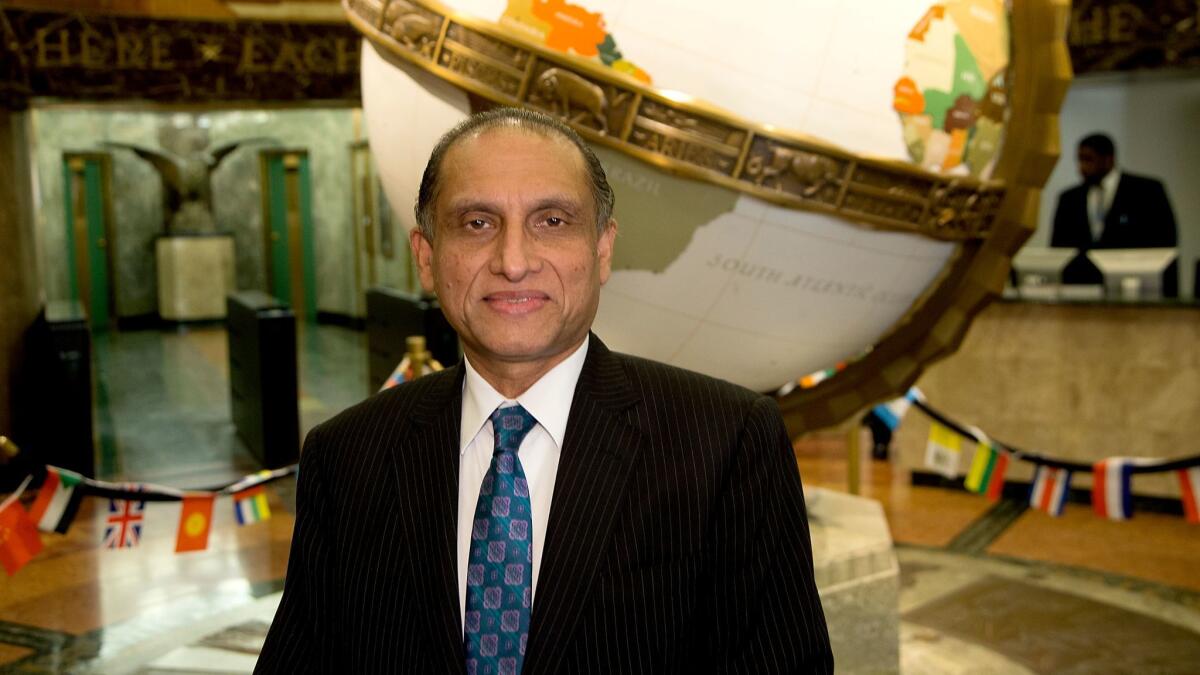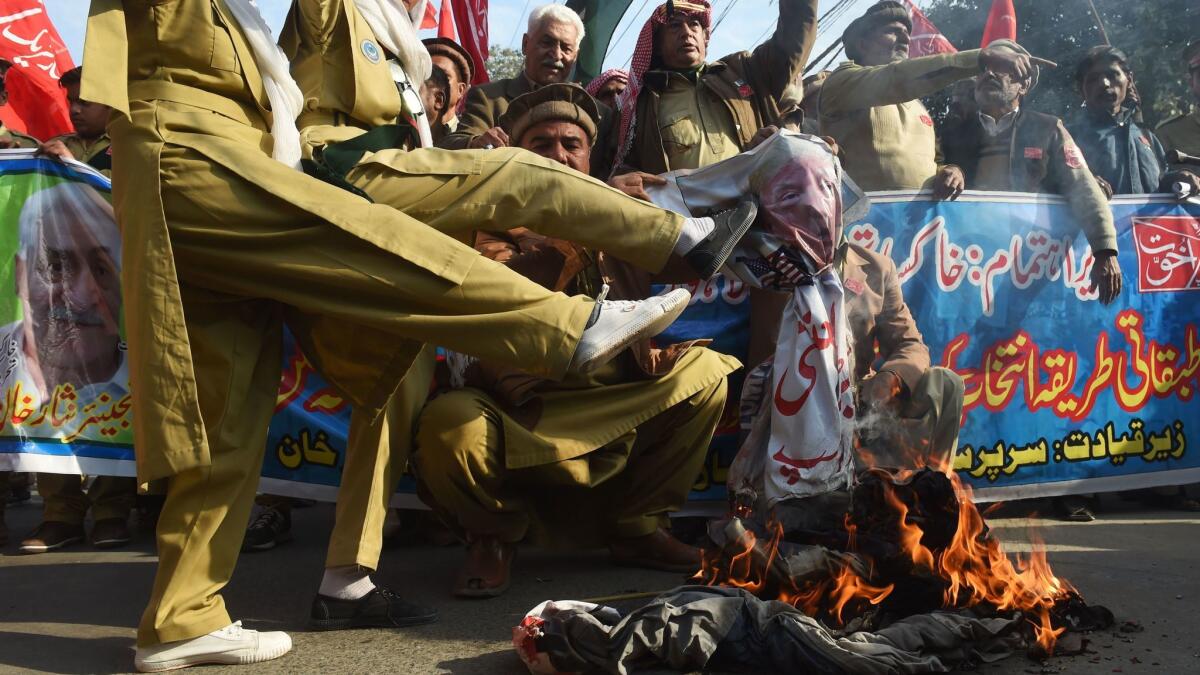America must stop scapegoating Pakistan for its failures in Afghanistan, says Pakistani envoy to the U.S.

- Share via
Tensions between the United States and Pakistan seemed headed toward the breaking point in recent weeks after President Trump angrily accused the South Asian nation of failing to stamp out anti-American militants there or help the U.S.-led war in neighboring Afghanistan — charges an irked Islamabad rejected.
On New Year’s Day, Trump tweeted that the United States had “foolishly given Pakistan more than 33 billion dollars in aid over the last 15 years, and they have given us nothing but lies & deceit, thinking of our leaders as fools.” The president accused Pakistan of providing a “safe haven to the terrorists we hunt in Afghanistan,” while providing “little help.”
“No more!” Trump declared. Three days later, Washington announced that it was withholding nearly $1 billion in security aid for Pakistan.
But in a recent conversation with The Times’ Editorial Board and reporters, Pakistan’s ambassador to the U.S., Aizaz Ahmad Chaudhry, tempered concerns that relations between the two nations had entered an irreparable danger zone and shared his views on possible solutions for ending the conflict in Afghanistan.
The interview has been edited for length and clarity.
How serious is the tension between the U.S. and Pakistan?
This is a very important relationship for us. For 70 years, Pakistan and the United States have worked together. We think we achieved results when we worked together. [For example] during the ’60s when there was a mighty big challenge from the communist world and then in the ’80s when the Soviet Union invaded Afghanistan, the United States and Pakistan worked together. And again in the 2000s when Al Qaeda posed the challenge that it did and we achieved results.
This time around, unfortunately, the United States and Pakistan have begun to focus more on what divides them, rather than on what unites them. And that’s something that we hope will change.
The tweet that Trump issued on the eve of New Year caused considerable disappointment and surprise to us. Disappointment because we believe that Pakistan and the United States have worked together for decades and the relationship should not be categorized and described in the terms that it was done. In Pakistan, there was big public outrage.
People felt that they were being singled out and humiliated and even threatened. And it was also a surprise because the conversations that we were having with the United States leadership were moving us in the direction of finding common ground.
We think there is still enough work to be done by Pakistan and the United States, particularly to stabilize Afghanistan ... and also to finish up what we started together, to eliminate terrorism from our region.
Pakistan says it’s working to stabilize Afghanistan and fight terrorism, but U.S. intelligence says Pakistan works with terrorist groups and allows some cross-border terror to occur. What should we make of these competing narratives?
In the last couple of years, Pakistan has come a long way in defeating terrorism and that’s a reality. In 2013 and 2014 … the military moved into northern Waziristan tribal areas, and 2½ and 3 three years later the entire area has been cleaned up, secured — an area that for centuries was treated as a sort of no man’s land by the British, India and the Russian Empire.
Today it [has] settled governments, so that political vacuum which the militants and Taliban exploited is gone. They are on the run. We are pushing them away. In Pakistan, the law-and-order situation has drastically improved.
Now compare it with Afghanistan next door. The security situation is deteriorating. For us this is a big source of concern because when [the U.S.] leaves we will still be there. We have borne the brunt of all that instability in Afghanistan. All our gains against terrorism will be at risk if Afghanistan does not stabilize.
The way it is being perceived in Pakistan is that we are being scapegoated for failure in Afghanistan. We are the bogeyman.
— Aizaz Ahmad Chaudhry
The way it is being perceived in Pakistan is that we are being scapegoated for failure in Afghanistan. We are the bogeyman. [But] we don’t think that anyone from our intelligence would support elements who would kill their own children. That’s not acceptable to anyone of us. We don’t like the Taliban and the Haqqani [network, an Afghan militant insurgent group]. We do not want them in our land. They should be participating in the political mainstream in Afghanistan.
What should the U.S. be doing to engineer a political solution in Afghanistan?
We are happy that the United States has announced its commitment to stay in Afghanistan. We were always advocating a responsible drawdown or a responsible withdrawal, because we didn’t want Afghanistan to descend into civil war, because that would again have a severe impact on Pakistan.
Having said that, we think the United States needs to follow a more comprehensive approach. Afghanistan is not just what it is because Pakistan is allegedly supporting the Taliban. There are serious governance issues in Afghanistan. There are serious corruption issues. And then there’s the state of the Afghan security forces. There are desertions. And the drug trade is booming.
To say that all this mess is because Pakistan is providing some safe haven to some Taliban is an oversimplification of the quagmire called Afghanistan. We need to take a more holistic picture than just scapegoating our country.
What is Pakistan’s view of the U.S. potentially negotiating with the Taliban?
We have received mixed signals on that. We know the U.S. has announced a conditions-based approach, which means that they would like to stay in Afghanistan for as long as it takes to stabilize Afghanistan and to make sure that the U.S.-stated objective is achieved. That is, that Afghanistan does not become a safe haven for terrorists who could stage terrorist attacks like 9/11.
We think that part of that strategy should be a political approach, whereby creating an environment for Afghan factions to come together. We’ve got to convince the Taliban and persuade them that they have more to gain at the [negotiating] table than on the battlefield. That’s the challenge we have.
So it would be a pity if the United States and Pakistan pick up a bilateral fight rather than what is clearly a joint undertaking of shared interest in stabilizing Afghanistan and bring peace there.
How concerned are you that the U.S. might take unilateral action and carry out a strike against the Taliban in Pakistan?
I don’t think [it will]. I would strongly advise not to do that. Pakistan and the United States have worked together. They have been partners. Already when [Trump’s] indignities were thrown at the Pakistani people there was big commotion. But the government decided to give a very restrained and measured response because we didn’t want anti-Americanism to spread in Pakistan.

Since the suspension of aid do you see the possibility of things escalating — a serious rupture in relations between the two countries?
Our channels of communication are open. We are talking every day. But the conversations of the type that were happening during the previous administration, they’re not going on. There’s not structured engagement. It’s just conversations that we’re having. But we think that we need to actually engage more seriously and in a more structured format. It is important these conversations are continued and upgraded. Rupture, in my view, is not an option. It would be equally injurious to the U.S. and to Pakistan.
Many Americans hear the word “Pakistan” and think terrorism, or the place where Osama bin Laden was hiding. How do you change that narrative?
Well, a stereotype has developed. There is a gap between those perceptions and what has happened in Pakistan in recent years. It is not easy to change the perceptions once they have been entrenched. We are also telling the U.S. administration that you have to help us in changing those perceptions, because they don’t correspond to the on-ground reality.
If you keep using Pakistan as a scapegoat — or the perception is that it’s being used as a scapegoat — I think that will not help in any manner. Pakistan … wants to remain a friend. But if Pakistan is cornered and humiliated, I think that would not be good for the relationship.
For more on global development news, see our Global Development Watch page, and follow me @AMSimmons1 on Twitter
More to Read
Sign up for Essential California
The most important California stories and recommendations in your inbox every morning.
You may occasionally receive promotional content from the Los Angeles Times.














